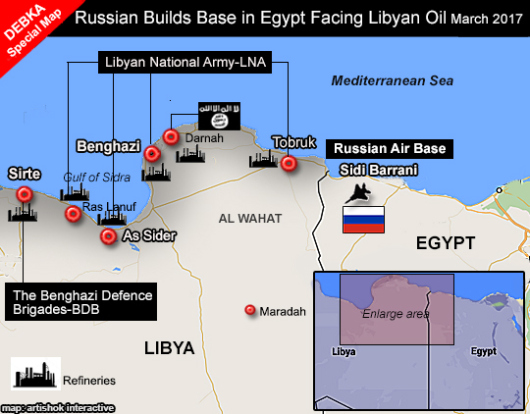Another Russian Air Base is Going up at Sidi Barrani, Egypt
Angry denials from Moscow and Cairo greeted reports of Russian special operations forces landing Tuesday, March 14, at the Egyptian air base of Sidi Barrani on the Mediterranean coast. This base lies notably 95km from the Libyan border ad 340km from the Libyan oil port of Tobruk.
“Russia did not do that. The defense ministry does not confirm it. It’s fake news that we don’t need to pay attention to,” said Vladimir Dzhabarov, first deputy chairman of the Federation Council’s Committee for International Affairs.
But the lawmaker gave it plenty of attention, declaring that such “throw-ins” are part of “the information war that is now being fought against everyone.”
An Egyptian official who preferred not to be named had this to say: “This report is totally incorrect,” calling it a “fabrication meant to tarnish Egypt’s image” and adding “Egypt is a sovereign country and does not accept the deployment of foreign troops on its territory.”
DEBKA Weekly’s military and intelligence sources characterize these denials as a smoke screen. They confirm that the Russians not only landed troops at Sidi Barrani this week, but began clearing the ground for the construction of a large Russian air base there, to be modeled on its Syrian Khmeinim Air Base in Latakia.
The plan is to expand the small air base into a large facility, able to accommodate Russian bombers, fighter jets, assault helicopters, special operations units and advanced S-300 and S-400 air defense missile batteries. Moscow is also planning to set up at Sidi Barrani the headquarters of a new African Command, corresponding to the US African Command. The Kremlin expects to end up with two large eastern Mediterranean air bases 1,013km apart and separated by only one country, Israel.
The Russian Air Force is on its second sojourn in Sidi Barrani, having used the base in the 60s for the Russian fighter jets which supported Egypt and Syria in the Arab wars against Israel as part of the Cold War. They exited the base in 1972.
The Russian teams went to work immediately on arrival, preparing the attack drones they brought with them for action and landing Russian engineers and weapons. The weapons were loaded on Egyptian trucks and rolled across the border for the 670km trip to Benghazi and delivery to Gen. Khalifa Hafter’s Libyan National Army (LNA).
The Russians were in a hurry to provide support for this ally. On Friday, March 3, his LNA suffered a defeat in a central Libyan battle at the hands of the rival Benghazi Defense Brigades (BDB), which was able to seize five towns and the big Es Sider and Ras Lanuf oil terminals in the main exit points for Libyan oil exports.
The BNB fought with the advantage of advanced tanks delivered by sea from Germany and Italy in the last fortnight. This week, Moscow transferred to Sidi Barrani the weaponry Hafter’s troops needed to recover the oil terminals. The United Arab Emirates footed the bill. Results were almost immediate.
US Africa Command spokesperson Robyn Mach disclosed Tuesday, March 14, that Libyan National Army forces under Gen. Hafter had begun a ground assault against the Benghazi Defense Brigades around Ras Lanuf oil port. “We are monitoring the situation,” he said.
By Thursday, March 16, the LNA had managed to turn the military situation round, retaken the two oil export terminals, and driven further west toward Sirte.
Hafter’s forces took little more than a day to recapture the two oil ports after ten days of airstrikes against the BDF, mostly by the Egyptian air force.
Just as the Russians stepped up their military intervention in Syria in September 2015, at the height of its civil war, so too they are throwing their full support behind Gen. Hafter at a climactic moment of the Libyan conflict.


